Dak Nong Province is situated in the southwestern area of Tay Nguyen (the Central Highlands), on the ancient plateau of Dac Nong-Dac Mil. It has fertile basalt soil and a temperate tropical climate, very favourable for agricultural production. With strength in industrial plants and cattle and poultry the province can develop into a large production area.
Fertile basalt soil brings advantages for Dak Nong Province to develop many industrial plants of high value, such as coffee, rubber, pepper and cashew. Industrial crops account for nearly 50% of the province’s plant area. There are large areas specializing in growing plants and creating a stable source of materials for the processing industry serving the domestic demand and for export.
Fertile basalt soil brings advantages for Dak Nong Province to develop many industrial plants of high value, such as coffee, rubber, pepper and cashew. Industrial crops account for nearly 50% of the province’s plant area. There are large areas specializing in growing plants and creating a stable source of materials for the processing industry serving the domestic demand and for export.
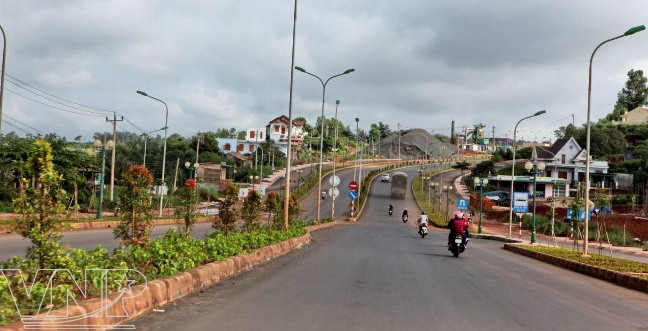 The road leading to Dak Nong Plateau. 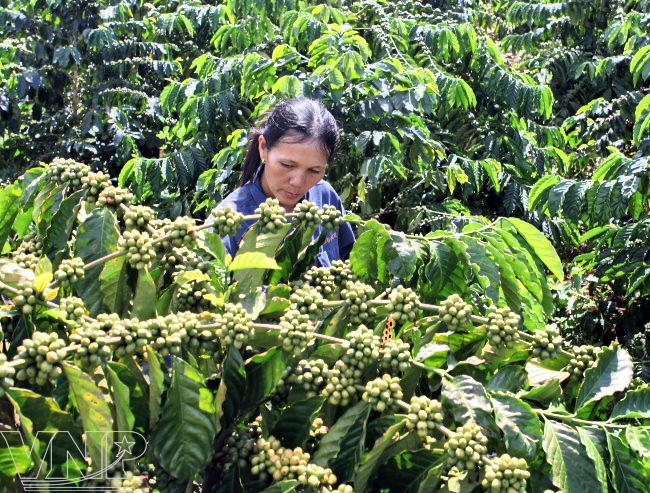 Coffee production is the major industry in Dak Nong Province. 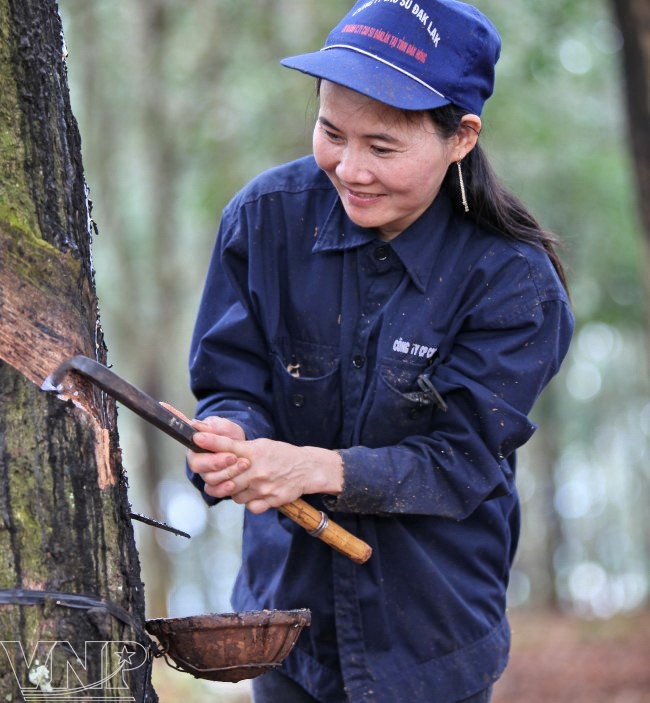 A worker of DANORUCO Rubber Joint-Stock Company. |
Agricultural products like coffee, rubber, cashew and pepper are the main exports of the province, with an expected export turnover of 550 million USD in 2015. In recent years, due to the stability of high prices and the profitable production, the industrial plant-cultivation area has been expanded.
Now, in addition to the plant cultivation areas of the companies, the province has over 3,500 industrial plant farms, together with some domestic and foreign investment projects on agricultural cultivation, processing and service.
Coffee is a key industrial plant, accounting for 70% of perennial plants. It accounts for nearly 60% of agricultural products, and over 40% of the province’s GDP. Dak Nong coffee is known as a delicious, fragrant and delicate product.
A visitor to Dak Nong Province must not miss visiting vast coffee plantations in Dak Mil, Dak R’lap and Dak Song Districts. The province also has seven large-scale coffee processing plants with state-of-the-art equipment and technology.
Dak Nong Coffee Company Limited has over 1,200ha of coffee trees and nearly 800 workers. It produces about 1,000 tonnes of coffee beans a year and has a clean production line meeting the Utz Kapeh international standards.
Ranking second is rubber with an area of over 23,000ha which yields an output of nearly 8,500 tonnes a year. Rubber trees in Dak Nong Province have high productivity and high quality latex, particularly the rubber areas in Dak R’Lap, Tuy Duc and Krong No Districts.
The province has 27 rubber-cultivation companies and three latex processing plants and will have two new plants in the near future. Daknoruko Rubber Joint-Stock Company has over 1,000 ha of rubber and a processing plant, bringing jobs to about 500 local people.
After nearly two years of equalization, the company has exceeded the production and turnover targets. The company is striving to reach a turnover of about 60 billion VND and an export turnover of about 2 million USD in 2011.
Besides coffee and rubber, Dak Nong Province also has strength in cashew and pepper. It has over 20,000ha of cashews with an annual output of over 16,000ha tonnes and over 7,000ha of pepper with an annual output of more than 13,000 tonnes.
To ensure food security, the province focused on developing over 100,000ha of crops, such as rice, corn, potatoes, peanuts and soya beans. It also has nearly 1.4 million cattle and poultry.
Now, in addition to the plant cultivation areas of the companies, the province has over 3,500 industrial plant farms, together with some domestic and foreign investment projects on agricultural cultivation, processing and service.
Coffee is a key industrial plant, accounting for 70% of perennial plants. It accounts for nearly 60% of agricultural products, and over 40% of the province’s GDP. Dak Nong coffee is known as a delicious, fragrant and delicate product.
A visitor to Dak Nong Province must not miss visiting vast coffee plantations in Dak Mil, Dak R’lap and Dak Song Districts. The province also has seven large-scale coffee processing plants with state-of-the-art equipment and technology.
Dak Nong Coffee Company Limited has over 1,200ha of coffee trees and nearly 800 workers. It produces about 1,000 tonnes of coffee beans a year and has a clean production line meeting the Utz Kapeh international standards.
Ranking second is rubber with an area of over 23,000ha which yields an output of nearly 8,500 tonnes a year. Rubber trees in Dak Nong Province have high productivity and high quality latex, particularly the rubber areas in Dak R’Lap, Tuy Duc and Krong No Districts.
The province has 27 rubber-cultivation companies and three latex processing plants and will have two new plants in the near future. Daknoruko Rubber Joint-Stock Company has over 1,000 ha of rubber and a processing plant, bringing jobs to about 500 local people.
After nearly two years of equalization, the company has exceeded the production and turnover targets. The company is striving to reach a turnover of about 60 billion VND and an export turnover of about 2 million USD in 2011.
Besides coffee and rubber, Dak Nong Province also has strength in cashew and pepper. It has over 20,000ha of cashews with an annual output of over 16,000ha tonnes and over 7,000ha of pepper with an annual output of more than 13,000 tonnes.
To ensure food security, the province focused on developing over 100,000ha of crops, such as rice, corn, potatoes, peanuts and soya beans. It also has nearly 1.4 million cattle and poultry.
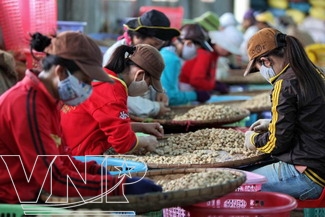 Processing peanuts at Tat Thang Food Industries Co. Ltd. |
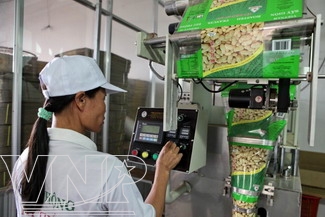 The dry peanut packaging line for export. |
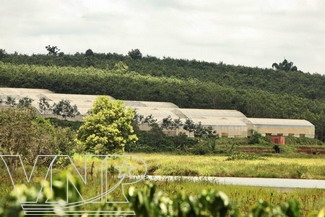 A vegetable farm that applies a high-tech agricultural the model in Dak Nong. |
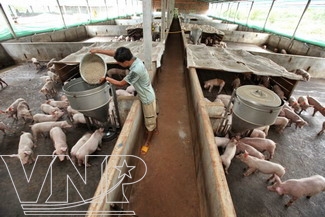 Developing the economy with animal husbandry. |
To develop agriculture in a sustainable way, Dak Nong is taking many measures, such as zoning specialized areas for growing major crops to ensure stable materials for the processing industry and for export, applying scientific and technical advances in production, developing the processing industry to increase competitiveness of agricultural products, attracting domestic and foreign investment, promoting technological application and transfer in production to make new breakthroughs.
With existing strengths along with an appropriate development strategy, the agricultural sector is making a worthy contribution to the economic achievements of Dak Nong Province. Thus, after over seven years of effort, the province’s average GDP growth rate has reached 15.19% a year, nearly 2.5 times the per capita income.
VNP